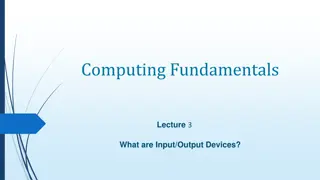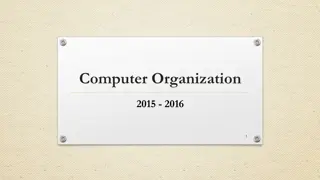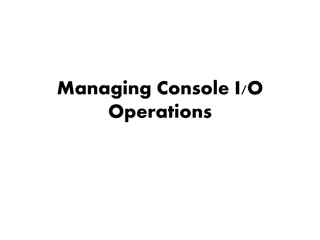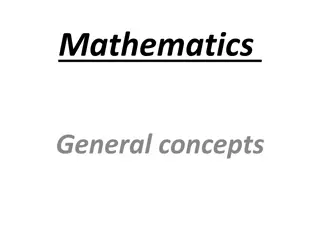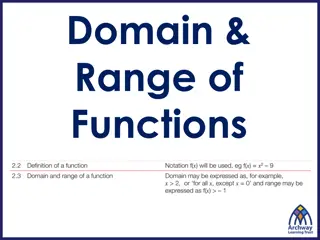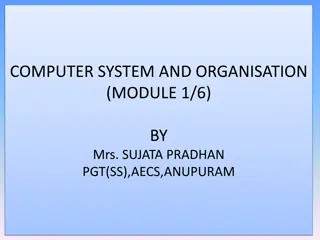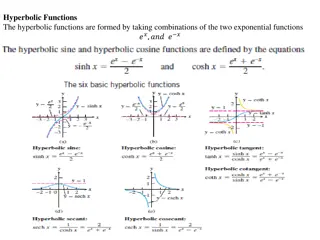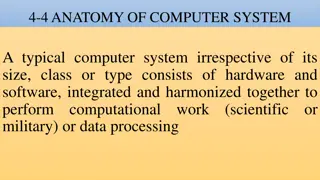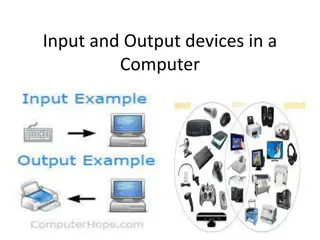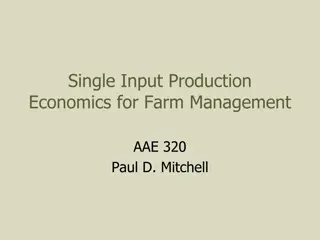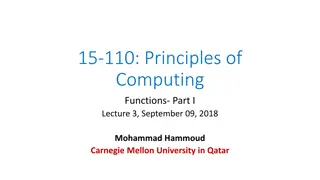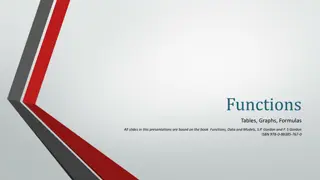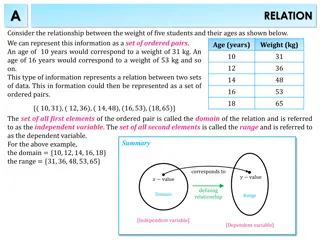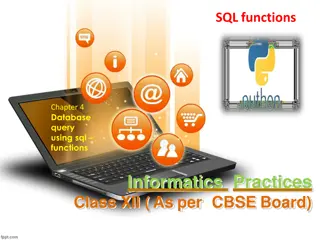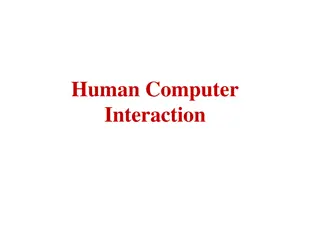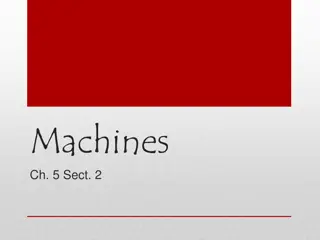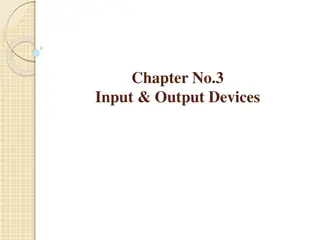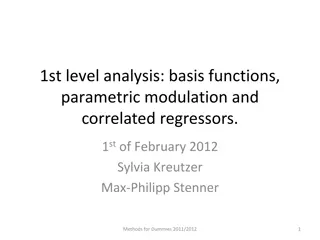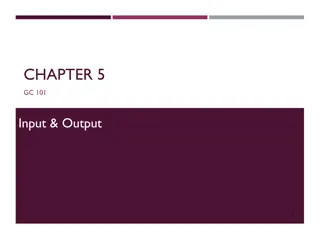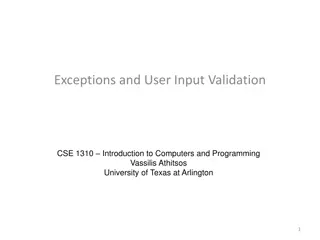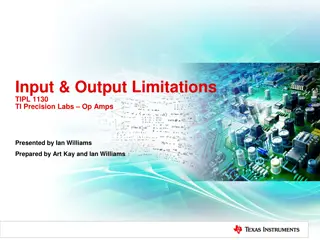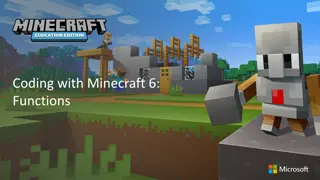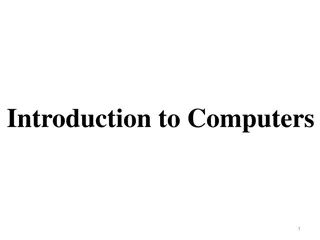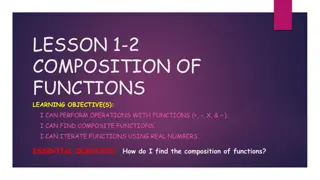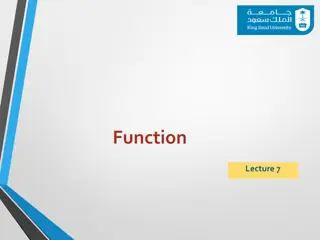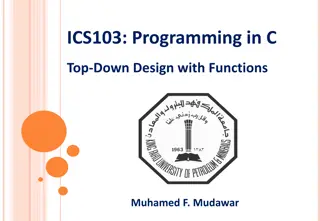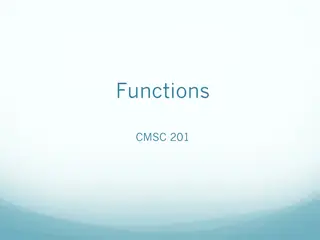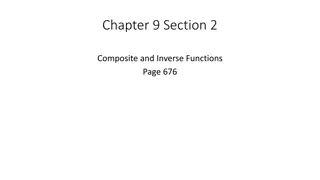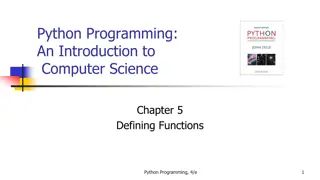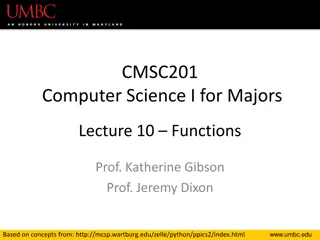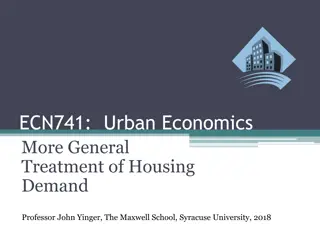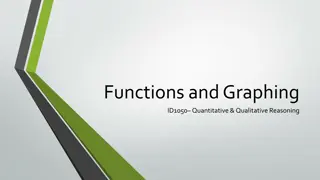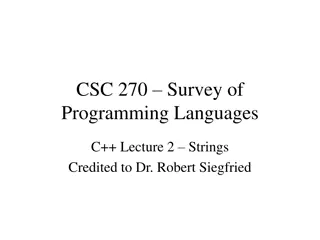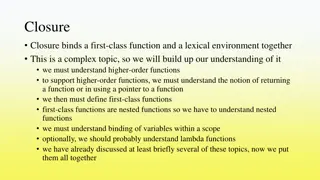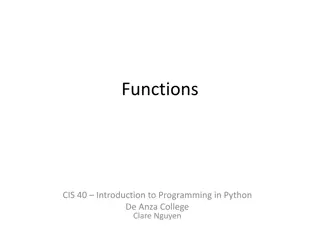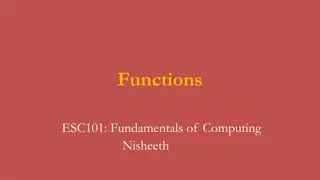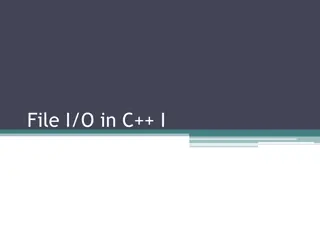Input and Output Devices in Computing
In computing, input and output devices play a crucial role in enabling communication between users and computers. Input devices are used to enter data into a computer, while output devices display or provide the results of processed information. Common input devices include keyboards, mice, and joys
1 views • 17 slides
Livestock Marketing Functions and Classification
Livestock marketing involves various functions such as exchange, physical supply, facilitative functions like grading, transportation, storage, and more. These functions are classified into primary, secondary, and tertiary functions based on their roles. Assembling, processing, distribution, and equ
3 views • 23 slides
Basic Input/Output Operations in Computer Organization
Basic Input/Output Operations are essential functions in computer systems that involve transferring data between processors and external devices like keyboards and displays. This task requires synchronization mechanisms due to differences in processing speeds. The process involves reading characters
0 views • 11 slides
C++ I/O Operations: Streams, Stream Classes, and Functions
C++ I/O operations involve managing console input and output using streams, stream classes, and functions. Learn about stream types, stream classes for console I/O, unformatted I/O operations, put() and get() functions for character I/O, getline() and write() functions, formatted console I/O operati
0 views • 37 slides
Functions and Graphs in Mathematics
Functions are a fundamental concept in mathematics used to describe relationships in the real world. They can be represented through equations, graphs, tables, or verbal descriptions. A function maps elements from a domain to a range, where each input has a unique output. The domain encompasses all
0 views • 4 slides
Domain and Range of Functions
Understanding functions involves exploring concepts such as domain, range, and algebraic inputs. This content covers topics like constructing functions, common functions like quadratic and trigonometric, and solving functions based on given domain and range. It also provides practice questions to te
1 views • 21 slides
Computer System and Organization
Computer Organization involves the logical structure of a computer, defining the interconnections of components for optimal performance. Computers process data through an Input-Process-Output cycle, with input, processing, and output units working together. The characteristics of a computer include
2 views • 20 slides
Hyperbolic Functions and Their Inverses
This content delves into the world of hyperbolic functions, discussing their formation from exponential functions, identities, derivatives, and inverse hyperbolic functions. The text explores crucial concepts such as hyperbolic trigonometric identities, derivatives of hyperbolic functions, and integ
1 views • 9 slides
Anatomy of a Computer System: Hardware Components and Functions
A typical computer system consists of hardware and software working together to perform various computational tasks. The hardware components include the central processing unit (CPU), input/output devices, storage units, and the motherboard. The CPU acts as the main brain of the computer, performing
7 views • 6 slides
Input and Output Devices in a Computer
Input devices play a crucial role in sending data to a computer, allowing users to communicate instructions for processing, display, storage, and transmission. Key input devices include keyboards and mice, each serving specific functions and enhancing data collection and accuracy. Discover the advan
0 views • 17 slides
Production Economics and Farm Management Essentials
Understanding production economics for effective farm management involves analyzing single and multiple input production functions to optimize input use and output combinations. Explore the concept of production, production functions, and examples such as linear, quadratic, and cubic functions in ag
0 views • 44 slides
Functions in Python: Basics and Usage
In this lecture on functions in Python, the focus is on the basics of defining and using functions. The session covers the formal definition of functions, parameters, local and global scopes of variables, return values, and pass-by-value concept. It emphasizes the importance of proper indentation in
4 views • 28 slides
Functions: Tables, Graphs, and Formulas Based on Functions, Data, and Models
Explore the world of functions through tables, graphs, and formulas in this presentation based on the book "Functions, Data, and Models" by S.P. Gordon and F.S. Gordon. Learn how functions in the real world work, understand the relationship between variables, and see different representations of fun
0 views • 29 slides
Relations and Functions in Mathematics
A relation is a correspondence between two sets where each element in the first set (domain) corresponds to at least one element in the second set (range). Functions are special relations where each element in the domain has a unique correspondence in the range. Surjective functions map the entire r
0 views • 12 slides
SQL Functions for Database Queries
SQL functions are essential elements in performing actions and obtaining results in a database query. They come in two main types: scalar functions and aggregate functions. Scalar functions operate on single values, while aggregate functions operate on sets of data. Examples of SQL functions include
1 views • 14 slides
Human-Computer Interaction and Input Devices
Human-Computer Interaction involves the interaction between users and computers, exploring various input devices such as keyboards, handwriting recognition, and pointing devices. Learn about the evolution from batch data entry to modern forms of interaction, including speech recognition and stylus i
0 views • 12 slides
Machines: Work, Forces, and Efficiency
Machines play a vital role in making work easier by increasing force, distance, or changing the direction of applied force. Different types of machines like levers, pulleys, and inclined planes simplify work processes. Understanding input and output forces, as well as input and output work, is essen
2 views • 10 slides
Input and Output Devices in Computers
Input devices like keyboards, mice, joysticks, light pens, scanners, and more play a crucial role in interacting with computers. This chapter explores the functions and features of various input devices used in computing, such as keyboards for data input, mice for cursor control, and joysticks for C
1 views • 12 slides
Basis Functions and Hemodynamic Response Functions in fMRI Analysis
This content discusses the use of basis functions, parametric modulation, and correlated regressors in the first-level analysis of fMRI data processing. It delves into the concept of temporal basis functions for modeling complex functions of interest, such as the canonical hemodynamic response funct
1 views • 26 slides
Interactive Programs and Input/Output in Java
Interactive programs in Java allow users to input data through the console, which can be captured and used in the program. This involves using the Scanner class to read user input, and understanding common Scanner methods to process different types of input. Importing Java class libraries is essenti
2 views • 15 slides
Input Validation in Java Programming: Handling Exceptions and User Input
Learn how to implement input validation in Java programming to prevent crashes when users provide invalid input. Explore strategies for handling exceptions like InputMismatchException and the importance of reading strings directly from user input. Discover methods for converting strings to numbers a
2 views • 33 slides
Input and Output Limitations in Op Amps
Explore the various input and output limitations in TI Precision Labs Op Amps as presented by Ian Williams and prepared by Art Kay and Ian Williams. Delve into common mode voltage, voltage swing, data sheet parameters translation, input and output stages, examples of common mode voltage, and potenti
0 views • 15 slides
Functions in Coding with Minecraft
Functions in coding are self-contained sets of instructions that perform specific tasks within a computer program. They allow for code reuse and save time by writing instructions once as a function and calling it whenever needed. This content covers the purpose of functions, how they save time when
1 views • 30 slides
Scanner Class in Java: Reading User Input and Processing Files
The Scanner class in Java's java.util package allows reading input from the keyboard or files. It looks for tokens in the input, reads different types of values, and has methods like nextInt() and nextLine(). You can also read from files by creating a File object. Learn how to use Scanner to interac
0 views • 21 slides
Introduction to Computers: Understanding Hardware and Input Devices
Computers are electronic devices that process input to produce information. They consist of hardware components like CPUs, input/output units, and memory. Input devices such as keyboards, mice, and scanners help translate human-readable data for computer processing.
0 views • 11 slides
Composition of Functions in Mathematics
Learn how to perform operations with functions, find composite functions, and iterate functions using real numbers. Explore the composition of functions through examples and understand the domain of composite functions. Enhance your mathematical skills by mastering operations like addition, subtract
0 views • 10 slides
Functions in C Programming
Functions play a vital role in C programming by enabling the execution of specific tasks. They can be pre-defined or user-defined, offering flexibility and efficiency in code organization and execution. Pre-defined functions are already available in C libraries, while user-defined functions are cust
2 views • 46 slides
Introduction to Programming in C: Top-Down Design with Functions
Learn about the fundamental aspects of programming in C focusing on top-down design with functions, code reuse, and the importance of library functions. Explore the concept of functions, their input arguments, and result values, along with examples of mathematical library functions like sqrt, exp, l
0 views • 33 slides
Functions in Programming
In programming, functions are like machines that take input and produce output. They help in organizing code, making it reusable, and reducing redundancy. Functions have inputs called arguments and return values. By creating functions, you can easily perform tasks multiple times without rewriting th
0 views • 35 slides
Composite and Inverse Functions
Learn about composite functions, inverse functions, and how to find their compositions and inverses through examples and step-by-step explanations. Explore the concept of forming composite functions, verifying inverse functions, and finding the inverse of a function using interchange and solving met
0 views • 15 slides
Introduction to Defining Functions in Python Programming
This chapter introduces the concept of defining functions in Python programming. It covers the importance of dividing programs into sets of cooperating functions, defining new functions in Python, understanding function calls and parameter passing, and reducing code duplication through the use of fu
0 views • 78 slides
Functions in Computer Science I for Majors Lecture 10
Expanding on the importance of functions in programming, this lecture delves into dividing code into smaller, specific pieces, defining functions in Python, understanding function calls and parameter passing, and using functions to enhance code modularity. Key topics covered include control structur
0 views • 62 slides
Functions and Data Types in Programming
Exploring the concepts of functions, domains, and contracts in programming, as well as distinguishing between different data types such as numbers, strings, and images. Learn how to define functions, specify their input domains, and understand the output ranges they produce. Discover the importance
0 views • 17 slides
Housing Demand Theory in Urban Economics
Explore the nuances of housing demand theory in urban economics, covering topics such as alternative utility functions, exponential density functions, maximizing bid functions, and comparative statics. Delve into Stone-Geary and CES utility functions, their implications on demand functions, and the
0 views • 35 slides
Functions and Graphing in Mathematics
Functions and graphing play a crucial role in quantitative and qualitative reasoning. We explore the concept of points on a graph, coordinates, relations, functions, and ways to express functions. Utilizing visual aids and analogies, we delve into the importance of coordinates, the distinction betwe
0 views • 10 slides
Introduction to C++ Programming: Strings and Predefined Functions
This lecture covers essential concepts and functions related to strings in C++, including predefined functions in
0 views • 49 slides
Closures, Lambda Functions, and Higher-Order Functions in Programming
In programming, closures bind functions and lexical environments, while lambda functions are nameless and used by higher-order functions. Higher-order functions operate by applying other functions, such as map and fold functions. Example implementations in LISP demonstrate how these concepts are uti
2 views • 16 slides
Introduction to Python Functions: Overview and Usage
In this module, we delve into Python functions, exploring common built-in functions and how to create custom functions. We learn the properties of functions, how to coordinate multiple functions, and concepts of modularization. Discover the essence of functions in Python programming through practica
0 views • 17 slides
Functions in C Programming
Functions play a crucial role in C programming, allowing for modularity and reusability of code. This content covers the basics of functions, creating custom functions, passing arguments, returning values, and the anatomy of a C function. Learn about defining functions, passing arguments effectively
0 views • 24 slides
File Input/Output (I/O) in C++
File Input/Output (I/O) is an essential concept in C++ programming, allowing for interaction with files stored on secondary storage devices. This involves steps like including the fstream header file, declaring file stream variables, associating them with input/output sources, opening the file, perf
0 views • 19 slides
